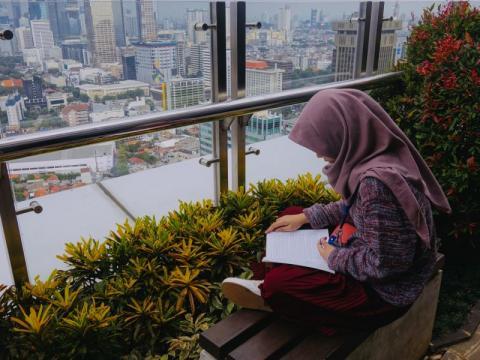Racism is alive within British higher education. More than half of university staff reported experiencing diverse forms of exclusion because of their race, including Islamophobia, according to the Equalities and Human Rights Commission (EHRC) 2019 inquiry.
These concerns were galvanised by the racist murder of George Floyd and the immense global mobilisation stirred by the Black Lives Matter movement. As a result, universities are more open to confronting issues of racism and providing a platform for staff and students from Black and ethnic minority backgrounds to share their experiences. Current equality, diversity and inclusion (EDI) policies are being reviewed, toolkits to tackle racism on campus are being devised, planning meetings scheduled – the list goes on.
Islamophobia: the elephant in the EDI room
But despite these broader discussions, Islamophobia continues to be the elephant in the room when issues of racism are brought to the table, even within academic spaces. Why is that? And how can we change it? The silence that suppresses open debate about Islamophobia within universities is in part because “Islamophobia” continues to be almost absent in institutional vocabulary around racism.
Despite numerous papers and empirical evidence for the scope of Islamophobia and its detrimental impact on British Muslims, Whitehall rejected the definition of Islamophobia as a “type of racism” put forward by the All-Party Parliamentary Group (APPG) on British Muslims in 2019. This meant that universities have been reluctant to act on the APPG report’s findings.
The continued enforcement of the Prevent duty , which places a responsibility on universities to “prevent people from being drawn into terrorism”, underpins structural racism in the form of Islamophobia. While combating terrorism is a necessity, the way Prevent is enacted in public institutions including universities is discriminatory, research shows. Despite being aimed at any form of “terrorist ideology”, Prevent’s implementation disproportionately targets Muslims, particularly those of precarious faith identity. They are more at risk of suspicion and surveillance and have been coerced into accepting Islamophobia as part of their day-to-day lived experience.
Prevent impedes constructive discussions around topics that are deemed to be sensitive and controversial. Not only does this fuel a dominant reductionist and Islamophobic discourse that fails to capture the complexity of Muslim- and Islam-related topics, it also silences dissident perspectives.
So how can institutions and educators tackle Islamophobia?
Challenging Islamophobia is multilayered and needs to take place at the macro and the micro level within universities. At the macro level, we need to see:
1) More representation of Muslim staff at every level
This will help Muslim students find staff they can relate to, come to for advice and view as role models. Recruiting more Muslim staff will provide opportunities for non-Muslim students and staff to interact with Muslim staff, increasing opportunities to challenge common stereotypes by fostering intercultural understanding. This may temper the hyper-visibility of the political discourse resulting from the “War on Terror”, which pits the West against Muslims. Researching my PhD, I found that Muslim academics within universities are continuously invested in correcting negative perceptions about Islam. They are hyper-conscious of how they should present themselves, which includes self-censorship as well as identity negotiation, to reduce common anti-Muslim suspicion.
2) Attempts to tackle anti-Muslim racism integrated into EDI policies
Islamophobia continues to be absent in the policy documents of too many universities, stifling action on anti-Muslim racism. Recognition of the problem is the first step.
3) The recognition of Islamophobia Awareness Month in all universities
While most UK universities celebrate Black History Month, in which events including talks, shows, exhibitions and lectures are held to confront anti-Black racism, few universities have opened their doors to Islamophobia Awareness Month. Allowing such campaigns would undoubtedly help to challenge the extremely negative views about Muslims.
The micro-level work takes place in the classroom and through academic discourse.
4) Recognise and integrate diverse perspectives and narratives into course material
It is not uncommon for humanities and social sciences to be dominated by essentialist tropes about Muslims as a “global threat”. Creating space for the counter or alternative narratives to be presented, helps to deconstruct the dominant one. Robust critical discussions should provide opportunities to reconstruct a narrative that validates the voices and experiences of Muslims within academic spaces. Art can be a powerful medium for deconstructing Islamophobia, from film to poetry and music.
5) Give a public platform to academic discussions
The movement to decolonise the curriculum has set the stage for anti-racist scholars, including Muslims, to combat racism through scholarly engagement. For instance, I co-organised a conference with committed anti-racist colleagues at the University of Edinburgh’s Alwaleed Centre. The event explored the diverse dynamics and constraints embedded in the scholarly activities surrounding Islam and Muslims within British academia. It provided insights into innovative methodologies that could deconstruct the prevailing narrative. The turnout of more than 200 people alongside 40 research paper submissions showed that a great appetite exists within academia and beyond to tackle this topic.
Growing momentum will ultimately reconstruct a narrative that reflects the complexity of issues relating to Islamophobia. One that Muslims can identify with. This road is not paved with roses, but anti-racist academics in some universities have started to make inroads and shake mainstream narratives. It is now incumbent on universities to encourage authentic engagement with Islamophobia as part of their commitment to equality, diversity and inclusion.
Ibtihal Ramadan is a lecturer in education at Swansea University. Prior to this she was a postdoctoral research fellow at the University of Edinburgh, Moray House School of Education and Sports. Her work focuses on inequalities in higher education, particularly pertaining issues of race, ethnicity and faith.




comment